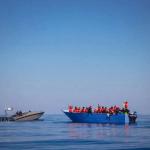Solidarity Is Not a Crime: Support for the NGO Ships

On May 21, at the Court of Trapani, the preliminary hearing was held in the criminal case initiated against 21 people, most of whom are part of three organizations active in sea rescue: among them we find the crew of the German ship Iuventa and those of the ships used until 2017 by MSF and Save the Children. We express our support for the affected individuals and organizations.
The investigation conducted by the Trapani Public Prosecutor’s Office, with the use of undercover agents and the massive and systematic use of wiretaps, including against lawyers and journalists, represents one of the most significant attacks against solidarity with migrant people to this day. This proceeding has a clear political dimension, and is having highly significant effects on relief organizations.
Its start coincided with the campaign against the NGOs, which in a few months went from being described as “angels” to “sea taxi drivers,” precisely at the time when Catania prosecutor Zuccaro claimed to have knowledge of alleged relations between Libyan traffickers and NGOs, a claim that Zuccaro himself later denied before Parliament. Contributing heavily at that stage to the criminalization of solidarity and NGOs was the “code of conduct” put forward by then-Minister Minniti, which at the same time forged relations with Libyan militias with the stated goal of blocking the Central Mediterranean route.
The systematic initiation of investigations against the crews of the rescued vessels severely affected their activities; in the case of the German organization, the effects of the proceedings were particularly severe: the ship Iuventa, which in its one year of operation rescued more than 14,000 people, is still under seizure in the port of Trapani and is now in a hopeless state of disrepair. While the shipwrecks continue and the interceptions at sea by Libyan authorities are increasing, in Italy, since the Trapani investigations, there have been a great number of proceedings brought against civil society organizations active in rescue at sea and also against those who carry out solidarity activities on land, at the borders and in the reception sphere.
As is well known, these proceedings are opened on the basis of Article 12 of the Consolidated Immigration Act, which punishes the aiding and abetting of irregular immigration. So far, they have almost always ended with the dismissal of the charges or acquittal of the defendants due to the recognition that their actions were justified by the fulfillment of a duty (that of sea rescue) or a state of necessity. The Supreme Court, in the case of Carola Rackete, also clarified that those who rescue migrants in the Mediterranean Sea and act to ensure their safe arrival in Italy do so in fulfillment of the international obligation to ensure the disembarking of shipwrecked people in a “safe” place, in accordance with the law of the sea and conventions protecting fundamental rights.
However, it is important to remember that in the “war on immigration” waged by European states, and Italy in particular, the victims of criminalization are often the migrants themselves, with even fewer guarantees and less support. This is the case with the summary trials of “boat people.”
Another similar example, fortunately with a happy ending, is the “Agaish” trial of four Eritrean refugees. After being convicted by the Rome Court of Appeals of aiding and abetting irregular immigration for helping their compatriots move to other Italian cities, they were acquitted on Friday by the Supreme Court after a six-year trial that also involved 18 months of pre-trial detention in prison. Their actions were very similar to those that were the object of the charges against the activists of the Baobab Experience NGO, who underwent a lengthy trial that recently ended in acquittal.
The war in Ukraine and the initiatives developed to facilitate the transit, reception and attainment of legal status for Ukrainians fleeing their country are an opportunity to rethink the legal, political and social categories with which we interpret the movement of people across borders. The wave of solidarity, both institutional and informal, that has accompanied the arrival of Ukrainians is broad and widespread, and those who welcome them or help them come to Europe are being rightly praised.
Why are the same actions considered criminal when they occur in the Mediterranean or towards those fleeing from other environments?
Originally published in Italian on May 21, 2022 https://ilmanifesto.it/la-solidarieta-non-e-un-crimine-a-sostegno-delle-navi-ong
